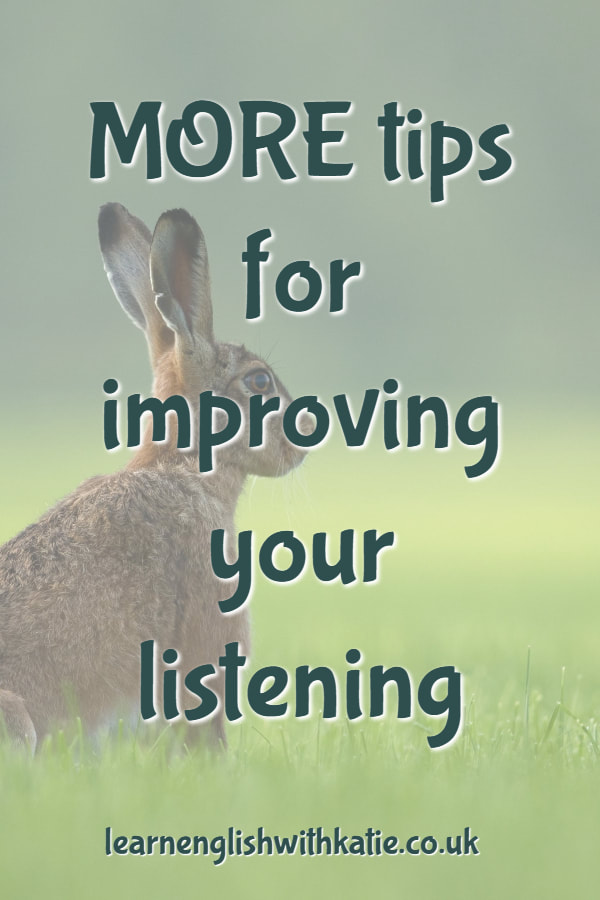|
I think the second most common question I'm asked is how to improve listening skills. (The most common question is about speaking!) Some time ago I wrote this post about listening but today I have some more tips for you. 1. Listen to familiar stories When I was learning French, I listened to a short version of Robinson Crusoe in French and I found it to be an enjoyable and useful experience. Because I already knew a bit about the story, I was able to understand more than usual and I could also guess a lot of the words that I didn’t know. You could try the same in English. There are apps and YouTube videos which enable you to listen to well-known stories, such as “Cinderella” or “The Hare and the Tortoise”. I might try to record some for you in future newsletters! 2. Learn more vocabulary Sometimes you don’t understand what you’re listening to simply because you don’t know enough of the words. Maybe you’re listening to something which is too difficult for your level. Or maybe you need to work on building up your knowledge of vocabulary before you can improve your listening skills further. You can improve your vocabulary by listening, of course. It’s good if you use subtitles or a transcript to find new words and check them in a dictionary. But my favourite way to learn vocabulary is by reading. 3. Learn about connected speech When native speakers talk at their normal speed, they drop certain letters, change the sounds of some letters and join some words together. This is called connected speech and it can make it difficult for non-native speakers to understand. Search for “Tim's pronunciation workshop” (by BBC Learning English) or just “connected speech” on YouTube and you’ll find lots of videos on the topic. 4. Repetition When I was teaching listening in a language school, I always used to play the audio twice. Students often understood more the second time around. When you’re practising listening, do you listen just once or do you listen twice or more? If you’re watching a film, it would be quite boring to watch the whole thing twice but you could repeat your favourite section. Another idea would be to find a five-minute video and listen to that more than once. 5. Listen to different accents It’s a good idea to get familiar with different accents. Try to listen to British, American, Australian and even non-native speakers. In this modern world, you’re likely to meet people from many countries or at least hear them on TV or online, so it isn’t a good idea to focus on just one accent. 6. Try dictation This means you try to write down what you hear. Find a short video with subtitles or a podcast with a transcript. Play the first sentence and pause the video/audio, then write down what you hear. You can listen as many times as you like. Then you can check with the subtitles or transcript to see if you have written it correctly. This will show you how well you’re doing with your listening skills and where you still have difficulties. You could even do this activity by listening to a song, writing it down and then checking the lyrics. 7. Be patient with yourself Sometimes people say things like “I’ve been learning English for a month but I still can’t understand what they’re saying in a movie!” OK, I’m exaggerating a bit to make my point! The thing is it takes a while to learn a language and develop your listening skills so be kind to yourself and be patient. Start with short easy videos and build it up gradually. Understand that it’s going to take time to see the results but you’ll get there if you don’t give up! 8. My favourite listening resources British English: BBC Learning English (YouTube, website) British Council Learn English (YouTube, website, apps) English with Lucy (YouTube) Real English (YouTube) Luke’s English Podcast American English: VOA Learning English (YouTube, website) English Class 101 (YouTube) Randall’s ESL Cyber Listening Lab: esl-lab.com (website) British and American: Simple English Videos (YouTube, website) English Listening Lesson Library Online: elllo.com (Website, YouTube) Lyricstraining.com (website) or Lingoclip (app) - for listening to songs For advanced learners: Ted Talks (YouTube, website) Netflix BBC News or anything that is for native speakers! If you would like to receive more tips for learning English and free English lessons by email, please sign up for my emails here:
0 Comments
Your comment will be posted after it is approved.
Leave a Reply. |
About the blogFollow the blog for mini lessons and tips on how to improve your English. Categories
All
Archives
July 2024
|

 RSS Feed
RSS Feed
